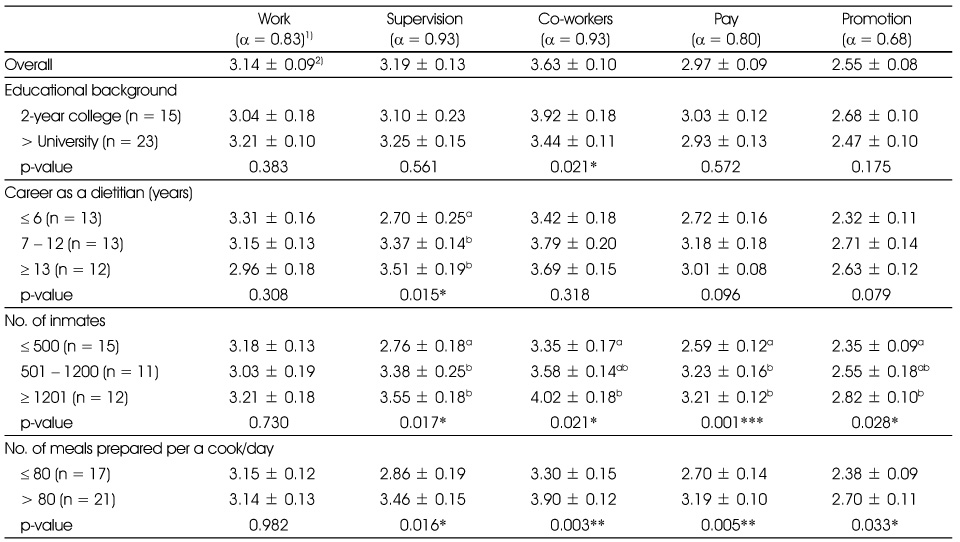Articles
- Page Path
- HOME > Korean J Community Nutr > Volume 17(3); 2012 > Article
-
Original Article
- The Job Satisfaction and the Turnover Intention of Dietitians Working at Foodservice of the Correctional Institutions in Korea
- In-Jae Cho, Hye-Sang Lee
-
Korean Journal of Community Nutrition 2012;17(3):321-328.
DOI: https://doi.org/10.5720/kjcn.2012.17.3.321
Published online: June 30, 2012
Department of Food & Nutrition, Andong National University, Andong, Korea.
- Corresponding author: Hye-Sang Lee, Dept of Food & Nutrition, Andong National University, 388 Songchun-dong, Andong, Gyeongbuk 760-749, Korea. Tel: (054) 820-5493, Fax: (054) 823-1625, hslee@andong.ac.kr
Copyright © 2012 The Korean Society of Community Nutrition
- 457 Views
- 1 Download
- 2 Crossref
Figure & Data
REFERENCES
Citations

- Study on Relations among Emotional Labor, Burnout, Engagement and Customer Orientation of High School Foodservice Employees in Busan Area
Kyung-A Lee, Eun-Soon Lyu
Korean journal of food and cookery science.2015; 31(3): 370. CrossRef - Contribution of Emotional Labor to Burnout and Work Engagement of School Foodservice Employees in Daegu and Gyeongbuk Province
Chang-Goo Heo, Kyung-A Lee
Journal of the Korean Society of Food Science and Nutrition.2015; 44(4): 610. CrossRef
Comparison of job satisfaction among dietitians working at the correctional institution by descriptive characteristics
1) Reliability statistics
2) Mean ± SE, A 5-point scale was used. ('5-strongly agree', '1-strongly disagree')
*: p < 0.05, **: p < 0.01, ***: p < 0.001
a, b Different superscripts mean significant differences at the alpha = 0.05 by an Duncan post-hoc test.
Comparison of job burnout and turnover intention among dietitians working at the correctional institution by descriptive characteristics
1) Reliability statistics, 2) Mean ± SE, A 5-point scale was used. ('5-strongly agree', '1-strongly disagree')
Correlation coefficients between job burnout / the turnover intention / general characteristics and job satisfaction / the turnover intention among dietitians working at the correctional institution
*: < 0.05, **: < 0.01, ***: < 0.001
Prediction of the job satisfaction and the turnover intention scores using regression model among dietitians working at the correctional institution
*: < 0.05, **: < 0.01, ***: < 0.001
1) Reliability statistics 2) Mean ± SE, A 5-point scale was used. ('5-strongly agree', '1-strongly disagree') *: p < 0.05, **: p < 0.01, ***: p < 0.001 a, b Different superscripts mean significant differences at the alpha = 0.05 by an Duncan post-hoc test.
1) Reliability statistics, 2) Mean ± SE, A 5-point scale was used. ('5-strongly agree', '1-strongly disagree')
*: < 0.05, **: < 0.01, ***: < 0.001
*: < 0.05, **: < 0.01, ***: < 0.001

 KSCN
KSCN




 PubReader
PubReader Cite
Cite


